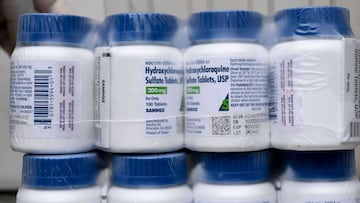Hydroxychloroquine side effects: adverse reactions to drug Trump taking for coronavirus
US President Donald Trump has revealed he is taking a daily dose of the malaria drug hydroxychloroquine, which can have lethal side effects.


US President Donald Trump confirmed on Monday that he is taking the drug hydroxychloroquine daily to try and avoid a possible infection from coronavirus. The drug is used normally as an anti-malarial medication which is also used to treat the symptoms of lupus and rheumatoid arthritis.
Trump however has been strenuously calling for the use of hydroxychloroquine in the prevention and treatment of Covid-19, however doctors have warned against taking it against the coronavirus because there is no proof it is an effective treatment. Two studies in New York, each involving 1,400 Covid-19 patients found no benefit. Another study in France concluded the drug had no impact.
Side effects of hydroxychloroquine
While hydroxychloroquine is on the World Health Organisation's list of the safest and most effective medicines needed in a health system and is generally well tolerated for people with no underlying illnesses, it does have a long list of side effects, some of which can be fatal. Please note this is not a full list of possible side effects. If you are taking or considering taking hydroxychloroquine please consult your doctor or medical provider if you have any concerns or queries or are feeling unwell. Full list of side effects.
Heart problems
One of the most serious side effects of hydroxychloroquine is a risk of heart rhythm problems, which can result in heart failure and in some cases death. Caution should be taken with patients with existing heart disease or conditions that affect heart rhythm.
Liver problems
Hydroxychloroquine should be used with caution in anyone with an existing liver condition, alcoholism or who is taking drugs that can be damaging to the liver.
Gastric irritation
Hydroxychloroquine can upset the stomach and should be used with caution in people suffering from gastric conditions.
People with diabetes
Hydroxychloroquine can cause life-threatening hypoglycemia in diabetic patients.
Psychiatric disorders
Hydroxychloroquine can cause nervousness, irritability, nightmares, psychosis and suicidal behaviour.
Skin problems
These can include rashes, irritation, pigmentation disorders, hair colour changes, hair loss and psoriasis, among others.
Eye disorders
Severe, permanent damage to the retina has been reported with the use of hydroxychloroquine, although long -term use is one of the risk factors. It can cause other visual disorders including visual field defects and loss of visual acuity, poor night vision, colour vision abnormalities, changes in the cornea and halos and blurred vision, among others.
Metabolism and nutrition problems
Hydroxychloroquine can cause reduced appetite, hypoglycemia and weight loss.
Muscular and skeletal problems
Hydroxychloroquine cam cause muscle weakness and atrophy, and loss of tendon reflexes and poor nerve conduction.
Danger of children accidentally taking hydroxychloroquine
Children can be particularly sensitive to some of the compounds in the drug, with fatalities being reported after accidental exposure, including small doses (e.g. 1g dose in a 3-year-old child).
Authorisation to take hydroxychloroquine
At present in the US, the FDA has given an emergency authorisation for the use of hydroxychloroquine for the treatment of Covid-19 allowing: "chloroquine phosphate and hydroxychloroquine sulfate donated to the Strategic National Stockpile (SNS) and distributed to states to be used by licensed healthcare providers to treat adults and teens hospitalized with Covid-19 who weigh more than 50 kg (110 pounds)”
The FDA does not allow the use of the drug for the prevention of Covid-19, and The American Medical Association, American Pharmacists Association and American Society of Health-System Pharmacists have issued a joint statement opposing the use of hydroxychloroquine for the prevention of Covid-19.
On April 23, the FDA said it had received several reports of safety issues with patients prescribed hydroxychloroquine for the treatment of Covid-19. The FDA said there had been case reports including "serious heart-related adverse events and death in patients."
European Medicines Agency reminder of serious side effects of hydroxychloroquine
Related stories
On 23 April, the European Medicines Agency put out a reminder of the serious side effects of hydroxychloroquine. The statement reminded healthcare professionals to closely monitor Covid-19 patients receiving hydroxychloroquine and in particular take into account existing heart problems.

